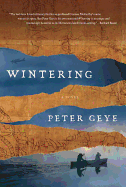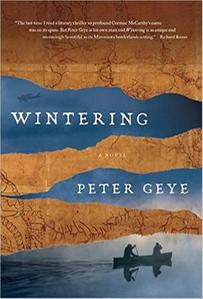
 In his second novel, The Lighthouse Road (after Safe from the Sea), Minneapolis novelist Peter Geye introduced the Norwegian immigrant Eide family living in Minnesota's Lake Superior town of Gunflint. Wintering continues the saga of the Eides' next generation, beginning as the elder, dementia-stricken Harry Eide wanders off one day into the wilderness to the north. Prompted by Harry's disappearance, his middle-aged son, Gus, thinks back to the winter when he was 18 and joined his father on a long canoe trek to the same Canada/Minnesota borderlands of the Laurentian Divide. Like Faulkner's Yoknapatawpha County, the imaginative Lake Superior north shore of Geye's three novels is a world of its own--colorful, provincial and buttoned-up. Wintering's narrator, Berit Lovig--Harry's late-in-life lover, long-time local postmistress, and for 40 years the caretaker of Gus's reclusive, cantankerous grandmother--knows much of Gunflint's complicated history. She tells Gus, "This town has always been good at having secrets, and terrible at keeping them." Among these secrets is the long, multi-generational conflict between the Eides and the family of Charlie Aas, a local political scoundrel in the pockets of mining and lumber companies, and the seducer of Harry's wife. As Gus tells his story to Berit and she tells hers to him, Geye's assured narrative gradually unfolds a Jack London-like tale of survival blended with a Richard Russo-like picture of small-town intrigue.
In his second novel, The Lighthouse Road (after Safe from the Sea), Minneapolis novelist Peter Geye introduced the Norwegian immigrant Eide family living in Minnesota's Lake Superior town of Gunflint. Wintering continues the saga of the Eides' next generation, beginning as the elder, dementia-stricken Harry Eide wanders off one day into the wilderness to the north. Prompted by Harry's disappearance, his middle-aged son, Gus, thinks back to the winter when he was 18 and joined his father on a long canoe trek to the same Canada/Minnesota borderlands of the Laurentian Divide. Like Faulkner's Yoknapatawpha County, the imaginative Lake Superior north shore of Geye's three novels is a world of its own--colorful, provincial and buttoned-up. Wintering's narrator, Berit Lovig--Harry's late-in-life lover, long-time local postmistress, and for 40 years the caretaker of Gus's reclusive, cantankerous grandmother--knows much of Gunflint's complicated history. She tells Gus, "This town has always been good at having secrets, and terrible at keeping them." Among these secrets is the long, multi-generational conflict between the Eides and the family of Charlie Aas, a local political scoundrel in the pockets of mining and lumber companies, and the seducer of Harry's wife. As Gus tells his story to Berit and she tells hers to him, Geye's assured narrative gradually unfolds a Jack London-like tale of survival blended with a Richard Russo-like picture of small-town intrigue.
Alone with Berit after Harry's gone, Gus unloads the painful memories of the backcountry months he spent with his difficult father--which, in hindsight, he believes were meant to show him "how barren the world was, how far away you could get." In winter, the borderland north of Duluth is a harsh and desolate place. Harry takes young Gus into this rough boondocks, re-creating the explorations of his much-studied and -admired early French fur trapping "voyageurs" who survived the brutal winters with nothing but makeshift wigwams and perseverance. Gus's recollections of their trip suggest a Hemingway-like fascination with finding one's manhood under duress--killing wild game for food, cutting firewood, chopping holes in thick ice to fish the lakes--and confronting a charged father/son relationship. As he tells Berit of his father and their experience, "[Harry] learned everything he knew--which was plenty--by trying until he didn't fail. He didn't fail much.... We're men. We need to see ourselves against the world. Against our fathers. I did."
Gus's memory of the uncharted lands far beyond the Devil's Maw rapids is at the center of Wintering, but Berit's perspective on her own past and that of the other immigrants arriving at Gunflint's port is an equally compelling history of patience and endurance. Geye dips into history with ease and comes out with a story as contemporary as anything flashing across our screens today. Wintering is a novel for the ages. --Bruce Jacobs, founding partner, Watermark Books & Cafe, Wichita, Kan.
Shelf Talker: Again set along the north shore of Lake Superior, Geye's third novel neatly balances a father/son story of wilderness survival with that of a small town's historical secrets and intrigue.

